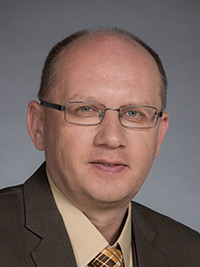
Professor
Robotics and Controls, Photonics and Nano Devices, Power and Energy Systems
215K ECE
Campus Box 352500
University of Washington
Seattle, WA 98195
Phone: 206-221-5729
Email: mamishev@ece.uw.edu
Research Web Page: Sensors, Energy, and Automation Laboratory
Research Web Page: Industrial Assessment Center
Biography
Alexander V. Mamishev received the equivalent of a B.S.E.E. degree from Kiev Polytechnic Institute, Ukraine, in 1992 and his M.S.E.E from Texas A&M University in 1994. In 1999 he completed a Ph.D. in electrical engineering and computer science at MIT, with a minor in technology management from Harvard Business School and MIT Sloan School of Management. Currently he is a professor and the director of the Sensors, Energy, and Automation Laboratory (SEAL) in the Department of Electrical Engineering, University of Washington, Seattle. Mamishev is author on more than 120 technical publications. He served as an associate editor for the IEEE Transactions on Dielectrics and Electrical Insulation. He is a recipient of the NSF CAREER Award, the IEEE Outstanding Branch Advisor Award, and the UW EE Outstanding Research Advisor Award.
Awards and Honors
- EE Faculty Early Career Award Winners (Direct link: https://www.ece.uw.edu/spotlight/ee-faculty-early-career-award-winners/)
Research Projects
Direct Link: http://uwseal.com/index.php/projects/
- Diet Data Recorder System (DDRS).Valid measurement of the intakes of foods in free-living persons is extraordinarily challenging. We propose a Diet Data Recorder System (DDRS) for the real-time recording of food consumption. Our approach in DDRS is to use an active vision technique that involves a video camera and a laser module integrated into the device to estimate the food volume.
- High Reliability Pump for Energy Efficient Liquid Cooling of Data Centers.Business losses due to reduced availability of data center service to business clients are too high when motherboards fail too often; therefore, the existing practice is to cool the entire data center building with disproportionally large air conditioning units and chilling towers. The Cooling HIgh Reliable Pump (CHIRP) provides efficient server board level liquid cooling as a solution.
- Improved Efficiency of Energy-Intensive Processes through Control of Build-Up on Critical Heat-Transfer Surfaces. The challenge of this project is to develop an automatically controlled system monitoring parameters of the current condition of high-energy industrial processes and determining trade-off between the maximum energy efficiency accomplishing with clean equipment and the costs of shutting down the equipment for cleaning operations.
- Thermal Management of Microelectronics Using Electrospray Evaporative Cooling (ESEC) Devices. Thermal management of microelectronics demands more efficient heat withdrawal capability due to a rapid increase in component and heat flux densities generated from the integrated circuits (ICs). Electrospray evaporative cooling (ESEC) is the potential package-level thermal management solution for the next generation of microelectronics.
- Measurement of Moisture Distribution in Organic Materials.Rapid development ofmicroelectronics has led to immense component density that has doubled every 12 months in the last decade. Each semiconductor component emits heat associated with the electrical resistance. The heat problem is one of the most profound obstacles in the electronics industry today.
- Heat Transfer Technology for Microelectronics and MEMS.The need to measure moisture distribution as a function of position is omnipresent at manufacturing industries. We design distributed sensor arrays capable of imaging moisturedistribution in organic materials, such as food products, paper, and chemicals.
- Condition-Based Maintenance of Electric Power Systems.Small robotic crawlers will scan electric cables with infrared, acoustic, and dielectrometry sensors in search of incipient faults and to estimate cable aging status.
- Sensitive Skin.Flexible distributed sensor arrays to sense normal/shear force, temperature and humidity for use in prosthetic devices and in human-robot interactions.
- Collaborative Projects. Collaborating on multidisciplinary research in the areas of aerosol science, fluid dynamics, and combustion.
- Substation Monitoring and Automation. This project is focused on development of novel sensors and signal processing algorithms for detection of incipient faults inpowers systems, both at transmission/distribution lines and at substations.
Recent Publications
- Makhsous, Sepehr, Hashem M. Mohammad, Jeannette M. Schenk, Alexander V. Mamishev, and Alan R. Kristal. "A Novel Mobile Structured Light System in Food 3D Reconstruction and Volume Estimation." Sensors 19, no. 3 (2019).
- Sep Makhsous, Aaron Zielinski, and Alexander V. Mamishev. “Post-Operative Stoma Management Based on 3D Image Reconstruction and Pattern Recognition.” Proceedings of FSDM 2018, vol. 309: 794-801.
- Wen, Tsrong-Yi, Hsiu-Che Wang, Igor Krichtafovitch, and Alexander V. Mamishev. "Novel electrodes of an electrostatic precipitator for air filtration." Journal of Electrostatics 73 (2015): 117-124.
- Tsrong-Yi Wen, Igor Krichtafovitch, Alexander V. Mamishev, “Reduction of aerosol particulates through the use of an electrostatic precipitator with guidance-plate-covered collecting electrodes,” Journal of Aerosol Science, Volume 79, January 2015, Pages 40–47
- T. Y. Wen, I. Krichtafovitch, and A. V. Mamishev, "The Key Energy Performance of Novel ElectrostaticPrecipitators," Journal of Building Engineering, vol. 2, pp. 77-84, 2015
Students
- Sep Makhsous
- Aditya Sharma
- Ravi Sankar Vaddi
- Hiralben Mistry
- Nikhil Sharma
- Andrew Hall
Research Centers
University of Washington Industrial Assessment Center: https://lamarr.ece.uw.edu/energy/iac/index.html